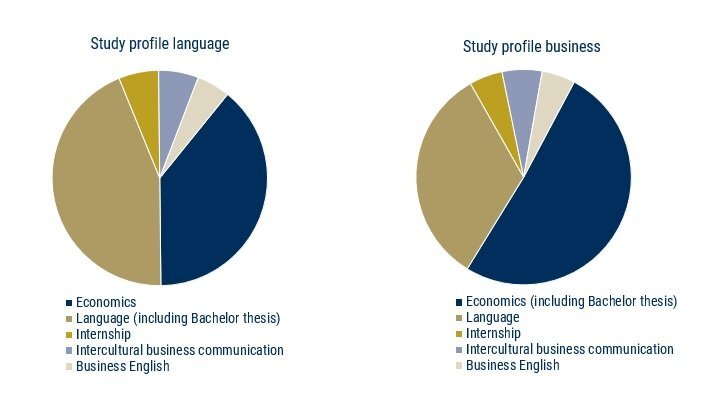
Programme content
Salam! Bonjour! Bună ziua! – Say hello to the world of business!
In the age of globalization, speaking a common language has never been more important for business, tourism and political relations. Our bachelor’s programme in ‘Business and Languages’ will prepare you for work in an international setting. After all, hardly any large company can do without business experts and managers with an international flair.
If you browse the programmes offered by our faculty, you will come across the terms ‘Business Administration’ and ‘Economics’. But do you know the difference? This is quite important, because they are two of the basic aspects of the study programme in addition to your foreign language tuition, business information systems and scientific methods.
Business Administration mainly deals with processes involving companies, such as planning, logistics, marketing and computational models for decisions and actions. Economics looks at the bigger picture by studying macroeconomic relationships. Why do petrol prices fluctuate so much? How much national debt can we actually afford? These are some of the questions addressed by economists. A key focus is placed on the development of currencies and prices, as well as political decisions and the state of the economy.
Thanks to your specialist knowledge in Economics and Business Administration and a foreign language, you will graduate with a double qualification. And you will also focus on the world’s major language, as Business English is taught alongside the foundations of intercultural business communication.
So… what language do you want to specialize in? You have a huge choice at the Friedrich Schiller University Jena: Bulgarian, Polish, Czech, Russian, Serbian / Croatian, Portuguese, French, Italian, Romanian, Spanish or Arabic. You will only need prior knowledge (A2 level) if you choose to study French.
Digital discovery tour with free app: Would you like to solve some fun puzzles and learn more about studying at the Faculty of Economics and Business Administration? Click here for our interactive discovery tour app.
Structure
Our bachelor’s programme is the first degree qualifying graduates to work in their profession. The standard length of the study programme is six semesters, and different types of courses are offered for each module (e.g. seminars, lectures or exercises).
If you take a single-subject bachelor’s programme in ‘Business and Languages’, the combined field of study will comprise 180 credits (ECTS for short; 1 ECTS = 30 hours for attendance, preparation and follow-up work, private study, assessed coursework and examinations).
After the first two semesters, you will be able to choose a focus:
- Language: a greater focus on linguistic, cultural and literary skills; this is a requirement for undertaking a master’s degree in your chosen language
- Business: the acquisition of specialist knowledge of economic affairs; this is a requirement for entering the world of management and/or undertaking a master’s programme in Business Administration or Economics
Overview of study profiles
Picture: Sophie BartholomeFor first-year students without any prior knowledge of Spanish or Italian, compulsory preliminary courses (level A1) are held before the beginning of the lecture period.
If you already have previous knowledge in your profile languages Spanish, Italian or Portuguese, you should take a placement testExternal link before the start of your studies so that you can be assigned to the appropriate language courses.
How might your degree programme shape up?
The following table shows the possible structure of your course with a focus on business if you decide to study Spanish (with no prior knowledge):
| Semester | Business | Languages |
| 1 |
|
|
| Business English (3 ECTS) | ||
| 2 |
|
|
| Business English (3 ECTS) | ||
| 3 |
|
|
| 4 |
|
|
| Internship (in the lecture-free period, 10 ECTS) | ||
| 5 |
|
|
| Intercultural Business Communication (10 ECTS) | ||
| 6 |
|
|
| General key qualifications, e.g. Intercultural Training from the Intercultural Office (1 ECTS), Project Management (3 ECTS), Writing Course (2 ECTS) | ||
| Bachelor’s thesis (10 ECTS) | ||
Abbreviations: ECTS = European Credit Transfer and Accumulation System (credit points)
More detailed information on the programme, arranged by subjects and languages, can be found in the sample study plansExternal link and on the website of the Faculty of Economics and Business AdministrationExternal link.
Why study in Jena?
- Choice of focus: Shape your studies according to your personal strengths and interests. We also offer intensive language courses.
- Research focus: The chairs of the Faculty of Economics and Business Administration de conduct research in various areas that are covered by the degree programme, such as ‘Accounting, Taxation and Capital Markets’, ‘Corporate Governance: Management and Corporate Control’ and ‘Decision and Risk’.
- Adventures abroad: The University and the Faculty of Economics and Business Administration de promote and encourage intercultural exchange through a wide range of programmes and initiatives. The faculty has a global network of over 50 renowned partner universities de, and more first-class institutes are added on a regular basis.
- Integrated vocational internship: Students can get an insight into typical areas of employment during an internship lasting six to nine weeks.
- Close cooperation: Make the most of our extensive network of business contacts in Thuringia.
- Excellent supervision: As we want our new students to feel comfortable and find their feet right from the start, the Orientation Days at the Faculty of Economics and Business Administration de provide more information on the organization of studies, institutions and university services.
What can you do after your studies?
Areas of employment for graduates
Bewerbungsgespräch
Image: Sebastian Reuter- Management in an international setting (e.g. business or public administration)
- Cultural exchange
- Tourism
- Leisure
- Teaching and research institutions
- Organizations promoting international cooperation
- Translation departments
- Science and research (e.g. as a teaching associate at a university, generally with a master’s degree)
Downloads and links for the degree programme
What are we looking for in prospective students?
- An interest in current affairs in business and economics
- Good knowledge of German (language of instruction: German)
- An interest in your chosen language
- Good organization skills and time management
- Knowledge of mathematics and statistics
Admission requirements
-
University entrance qualification
A university entrance qualification, such as a general secondary school leaving certificate, is required for admission onto the study programme.
More information on university entrance qualifications can be found here.
-
Language requirements
- sufficient knowledge of English; to be proven by the school leaving grade, average grade of the last two years, if applicable (at least grade 3 or 8 points according to the German grading system), or by a language test with the following minimum resu 5.lts: level B2 of the Common European Framework of Reference for Languages, or IELTS 5.5, or TOEFL: 80 (IBT), or a recognized equivalent (ESOL test, CPE, CAE) (more information de)
- for French, previous knowledge at level A2 is requirement (see Placement testExternal link)
- all other languages can be studied without previous knowledge
- if you have previous knowledge, you can—unless you have chosen Arabic—start at a higher level (A2, B1 or B”, depending on the language chosen)
- applicants from abroad must prove German language proficiency at the level of the DSH examination (level 2) or TestDaF level 4 (TDN 4) or a recognized equivalent
- sufficient knowledge of English; to be proven by the school leaving grade, average grade of the last two years, if applicable (at least grade 3 or 8 points according to the German grading system), or by a language test with the following minimum resu 5.lts: level B2 of the Common European Framework of Reference for Languages, or IELTS 5.5, or TOEFL: 80 (IBT), or a recognized equivalent (ESOL test, CPE, CAE) (more information de)
Contacts
Room 4.97
Carl-Zeiß-Straße 3
07743 Jena
Google Maps site planExternal link
Opening hours:
Mondays to Fridays 08:30 to 11:30
Carl-Zeiß-Straße 3
07743 Jena
Google Maps site planExternal link
Opening hours:
Monday: closed
Tuesday: 08.30 to 11.30
Wednesday: 14.00 to 16.00
Thursday: 08.30 to 11.30
Friday: 08.30 to 11.30
Room 4.131
Carl-Zeiss-Str. 3
07743 Jena
Google Maps site planExternal link
University Main Building / SSZ
Fürstengraben 1
07743 Jena
Google Maps site planExternal link
Office hours:
The Central Student Advisory Service will be closed from 22 December 2025 to 2 January 2026. We will be happy to assist you again from 5 January 2026!
We offer consultations in person, by telephone, and via Zoom. You can make an appointment by calling us on +49 3641 9-411111 (Mondays to Fridays from 9:00 to 11:00) or outside these office hours on +49 3641 9-411200. You can also use our remote help desk.
Consultation hours:
Mondays, Tuesdays, Thursdays and Fridays (9:00 to 12:20), Tuesdays (14:00 to 18:00), and Wednesdays and Thursdays (14:00 to 16:00).
Video chat: To the video chat – Zoom Videochat ZeitenMondays to Fridays (12:30 to 13:00) Password ZSB2020 Data protection informationpdf, 101 kb
University Main Building, Room E065
Fürstengraben 1
07743 Jena
Google Maps site planExternal link
Opening hours:
Information Desk (UHG; Room E0.65)
Mondays (10:00 – 12:00)
Tuesdays (13:00 – 15:00)
Wednesdays (10:00 – 12:00)
Thursdays (13:00 – 15:00)
Fridays (10:00 – 12:00)
You can also use our remote help desk at
www.uni-jena.de/service-ssz
or send us your enquiries by post.
Telephone hours:
Mondays to Fridays
(9:00 – 11:00)
Postal address:
Friedrich-Schiller-Universität Jena
Studierenden-Service-Zentrum
07737 Jena
University Main Building
Fürstengraben 1
07743 Jena
Google Maps site planExternal link


